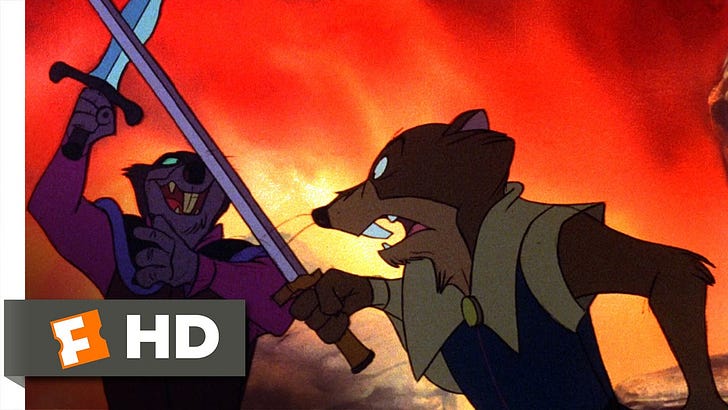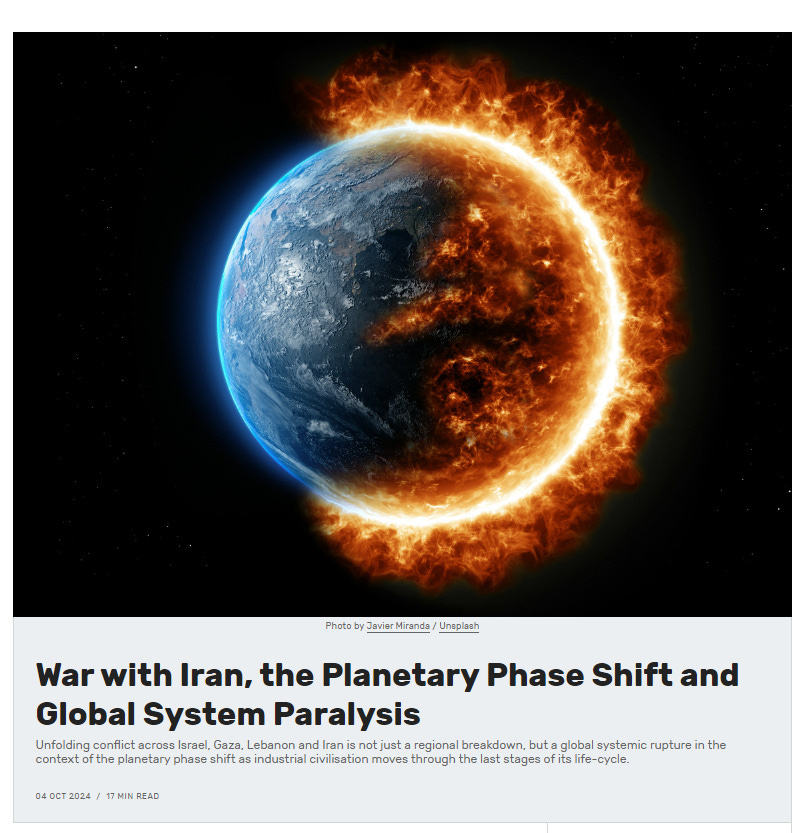The Great World Rush Toward the Seneca Cliff
The Philosophy of "Take what you can, when you can"
The 1982 movie, “Mrs. Frisby and the Secret of NIMH,” was eerie and fascinating, resonating with elements that describe our modern situation. A threatened society of rats needs to move away from danger, but internal rivalries put everyone at risk. The evil rat of the movie operates on the principle that goes as “take what you can when you can.” Mayhem ensues; the good rats win, but not without a struggle. It was supposed to be a movie for children, but as you can see in this clip, it was crude and violent. Reality is crude and violent, with our leaders behaving exactly like the bad rat of the movie, grabbing everything they can, while they can, and killing everyone who opposes them.
Nafeez Ahmed pinpoints our problems perfectly well in his blog in a post titled, “War With Iran, the Planetary Phase Shift, and Global System Paralysis.” We are seeing a war for resources, a mad rush to maintain control over what little is left, at the cost of destroying everything and everyone on the path. Ahmed’s interpretation highlights our powerlessness. “Democracy” theoretically means “Domain by the people,” but the people cannot do anything to stop our homicidal leaders from doing whatever they think will provide them with even more power.
Achille Mbembe was among the first to note the degradation of Western democracies in 2003, when he wrote his essay “Necropolitics,” later turned into a book with the same title. Mbembe says,
"As for democracies, they have not ceased to be emptied out and to be altered in their regime. As fantasies and accidents are now their sole subject matter, they have now become unpredictable and paranoid, anarchic powers without symbols, devoid of meaning and destiny. Lacking in justification, only ornament remains to them. Nothing, henceforth is inviolable, nothing is inalienable, and nothing is imprescriptible. Except, perhaps, property -- so far. In these conditions, it might well be that, at the bottom, no one is the citizen of any state in particular"
In short, we are facing a catastrophic collapse of governance. With democracy reduced to a tragedy or a farce (probably both things), who is at the helm? Maybe that nebulous entity we call the “Deep State.” It plays the same role as “Dark Matter” in cosmology, an entity whose existence we postulate to explain what we see but of which we can say nearly nothing. Neither dark matter nor the deep state are observable by instruments known to man.
How did we arrive at this? There was a time after WWII when the illusory abundance created by cheap fossil fuels made it possible to imagine a future in which peace could be attained by collaboration among the peoples of the world. That it was possible to think that the poor nations could rise to levels of prosperity comparable to those of the rich ones. And that everyone would have been happy with that.
The first wrench thrown in the gears of this idea was “The Limits to Growth” report to the Club of Rome, published in 1972. It told us that prosperity wouldn’t last forever. That the world’s economy was going to go through a cycle of growth and decline. That it would start falling like a stone at some moment during the first few decades of the 21st century.
It wasn’t a prophecy of doom. It was a warning. It was based on the idea that humankind’s future could and should be managed. That governments existed for the benefit of the people. That it was possible to arrive at shared decisions on the basis of the democratic process. Many of us are still operating according to a view of the world based on these concepts. But now that we have entered an age of terrible scarcity of resources, this view has become obsolete.
The beauty of the story is that we had predicted what was going to happen. Of course, the models of “The Limits to Growth” couldn’t tell us when and how a specific war would start. But it didn’t take a special effort of imagination to understand that with the economy falling and not enough resources for everyone, the strategy called “take what you can, when you can” would start to apply.
Whoever is in charge, if anyone, what we can observe is that the system is desperately trying to continue in the extractive paradigm. The leaders, the rich, the poor, the workers, the retirees, and everyone else think in the same way. More than fifty years of warnings that if something cannot continue, it will have to stop have led to nothing. We are only left with the attempt of drilling more, extracting more, killing more. The attempt to maintain the old ways at all costs is the perfect way to create the Seneca Collapse, that the Roman Philosopher Lucius Annaeus Seneca had identified long ago as “growth is slow, but ruin is rapid.” It was not unavoidable, but it wasn't avoided, and now it is the direction the world is taking.
But this is not the end of the world. It is the end of a world. What we are seeing are the spasms of the old system that desperately refuses to die and, in doing so, creates a lot of damage to everything, everybody, and itself. Better times will come, but as for all births, there will be plenty of pain in the process.
In his blog, Nafeez Ahmed has examined the situation with the war in Iran from a systemic viewpoint. He arrived at the correct conclusion that we are seeing a war for resources. Here is an excerpt from “War With Iran, the Planetary Phase Shift, and Global System Paralysis.” Click on the link for the full article.
Looking at the Middle East through a systems lens
Moving through these last stages of the life-cycle of industrial civilisation feels incredibly destabilising. It's why we are experiencing heightened potential tensions over resources that could amplify the risk of conflicts.
In the case of Israel-Palestine, it’s clear that the conflict has been radicalised by competing claims over resources – especially land and fossil fuel reserves – yet perhaps the biggest factor reinforcing the tendency to extreme violence has been the role of local manifestations of the industrial OS, as refracted through established repressive political structures.
On a planetary scale the incumbent industrial OS - encompassing worldview, values, governance systems, culture, and so on - is a fundamental constraining factor in the human capacity to scale through the planetary phase shift and successfully reorganise. Transformation requires a fundamentally new OS empowering us to understand our predicament, transcend our dying industrial paradigm, and align our material and cultural systems with planetary life-support systems.
This is simultaneously the case at regional and local levels. In the Middle East crisis, all actors are constrained by old paradigm ideologically-limited OS structures and values which interpret events through the lens of ethnonationalist categories, broken models of political engagement, and hierarchical modes of dialogue.
Predatory extraction
Whatever you believe about the history, rights and wrongs of this conflict, it is incontrovertible that the Israeli-PA-Hamas system is a fundamentally extractivist structure of regional resource exploitation and distribution. Indeed, Western support for Israel has been bound up with longstanding goals to monopolise access to Middle East oil.
That system is maintained through an overarching system of political and legal regulation which is enforced militarily. In this structure, land, water, energy and food resources are overwhelmingly monopolised by an ethnically and religiously defined group (Israelis) at the expense of other ethnically and religiously defined groups (Palestinians). Within these groups, there are also sub-groups of hierarchical control and exploitation.
What is clear is that this defunct paradigm is now imploding, because it is constraining perceptions of what’s possible and thereby limiting the range of perceived choices to ones that involve escalating indiscriminate violence.
This is due to an ‘Otherisation’ dynamic that scholars of conflict and genocide will be familiar with. When a system enters a state of crisis, people within it can often polarise into exclusionary group identities which are then scapegoated as the source of the crisis.
This usually happens in the context of an incumbent OS whose dominant ideology and worldview is incapable of recognising the system driving the crisis, and instead therefore leads people to become obsessively preoccupied by the surface symptoms of crisis (whether that is migration, unrest or violence, or something else).
By then responding primarily to symptoms rather than addressing the underlying system, actors can find themselves in a self-reinforcing feedback loop of destabilisation which fails to address the systemic drivers of crisis (that therefore continuously worsens, in spite of, indeed often because of, prevailing responses).
As the global system moves through the release stage and toward reorganisation, then, one thing that can happen is that interest groups and industries who are tied to the incumbent production system and OS, instead of embracing the need for change, double-down to protect dying incumbent structures – whether material or cultural.
This shows up as a mutual radicalisation process. We witness this in the regional conflict where all sides are hardening their traditional strategies. We see a concerted social polarisation effect in which mutual exclusion and Otherisation is reaching extreme levels increasingly justifying larger applications of mass violence as a solution. We also see a tendency to fall back on entrenched old paradigm ideologies in the region.
_______________________________________________






Its too cheap to use scapegoats like "homicidal leaders" or "deep state". Here in Switzerland many things are decided by transparent democratic vote: And so we recently and democratically decided by geenral vote that pesticides will not be limited on our fields, that drinking water will not be protected from toxic substances, and that the dwindling biodiversity will not be protected. The main problem is that - like a colony of Staphylococci on an Agar plate - we just grow until the resources are extracted. Staphylococci and humans do not have a sufficient intelligence or regulatory mechanisms to ensure their long term survival. Mother nature has organised it in another way.
Meanwhile in Palestine since 1967 Israel has deliberately destroyed ~a million olive trees, they say justified to save Western Civilisation.
On thin soils olive oil provides the necessary link for a renewable agrarian civilisation to have sufficient vital access not only to a food reserve, but also to a cash economy. The shipment of oil does not deplete the underlying soil nutrient resource and has been one ancient reponse that perpetuated agrarian settlement in certain environments.
I am reminded also that after razing cities and the use of two atom bombs, world-war thinking was paused and partially rejected in the Korean War, if only in its most extreme form. I suppose we can discuss the continuing use of bombing as an accessory to Western Civilisation and its response to resource and environmental issues?